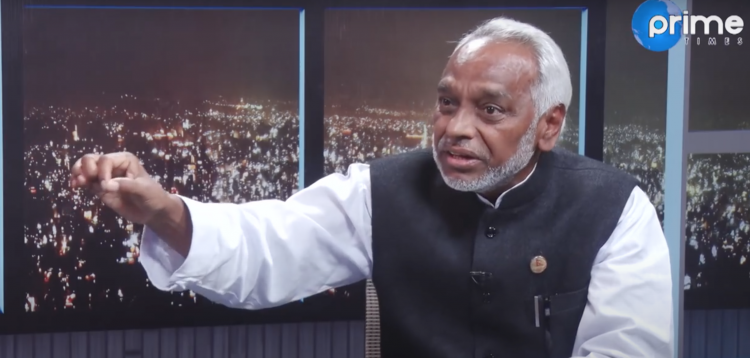Rajendra Mahato repeats debunked myth about Nepal’s water resources
Injina Panthi / June 4, 2020

Janata Samajwadi Party leader Rajendra Mahato speaking on Janata Janna Chanchhan program last month. Photo: Youtube grab
On the ‘Janata Janna Chahanchhan’ program aired on Prime Times Television on May 31, Janata Samajwadi Party leader Rajendra Mahato spoke in length about a new constitution amendment bill brought by the government to alter Nepal’s map. The interview program centered around whether the parliament would unanimously endorse the bill. Mahato said all parties support the new map but he wants a package deal on constitution amendment so as to address the grievances of the Madhesi people.
In the course of the interview, Mahato made a few claims, which South Asia Check has fact-checked and found two of them to be wrong.
First claim:
“During the 1989 economic blockade, [the government] brought kerosene from Bangkok by air.”
Toward the end of the Panchayat regime, India had imposed a 15-month-long blockade on Nepal apparently expressing dissatisfaction over Nepal’s purchase of weaponry from China. India announced the blockade right after the expiry of the Nepal-India treaties on trade and transit on March 23, 1989. India shut down 21 border points (10 main points and 11 others) with Nepal. India ended the blockade on July 1, 1990 after the restoration of democracy in Nepal.
In an interview published in Nagarik daily on October 5, 2015, Nara Bahadur Budhathoki, who was Nepal’s minister for commerce and supplies during the 1989 blockade, said that India, under pressure from the international community, had allowed Nepal to import fuel from Singapore via Kolkata. A translated version of the Nagarik interview was published in the Nepali Times weekly. In the interview, Budhathoki said Nepal had imported fuel also from Bangladesh during the 1989 blockade. Similarly, a report published by the Nepal Rastra Bank after the 2015 Indian economic blockade also mentioned that Nepal had imported fuel from Singapore and Bangladesh during the 1989 economic blockade.
Therefore, Mahato’s claim that Nepal airlifted fuel from Bangkok during the 1989 economic blockade is wrong.
Second claim:
“Nature has been benevolent to Nepal. Nepal is world’s second richest country in terms of water resources. But the water has been flowing out of the country for nothing. I mean water dollar, white gold. But Nepalis are growing poorer and poorer.”
Mahato’s second claim is also wrong. That Nepal is second richest country in the world in terms of water resources is just a popular myth.
South Asia Check had debunked this myth on January 18, 2017.
In that fact check report, we have mentioned that a country is regarded as rich or poor in water resources on the basis of the availability of renewable water resources within its territory.
The Food and Agriculture Organization of the United Nations had published a report in 2003, where the rich and poor countries of the world in terms of renewable water resources were identified. According to the report, Brazil, Russia, Canada, Indonesia, China, Columbia, USA, Peru and India are among the nine richest countries in terms of water resources. Nepal does not figure on the rich countries’ list.
This material is copyrighted but may be used for any purpose by giving due credit to southasiacheck.org.
Comments
Latest Stories
- In Public Interest Covid-19 cases are low, but that’s not an excuse to avoid vaccination
- In Public Interest What is BF.7, the sub-variant that has the world by its grip?
- In Public Interest Threat of a new Covid-19 wave looms large amid vaccine shortage in Nepal
- In Public Interest As cases decline, Covid-19 test centres in Kathmandu are desolate lot
- In Public Interest Dengue test fee disparity has patients wondering if they’re being cheated
- In Public Interest As dengue rages on, confusion galore about what it is and what its symptoms are. Here’s what you need to know
In Public Interest
 Covid-19 cases are low, but that’s not an excuse to avoid vaccination
The Pfizer-BioNTech bivalent vaccines authorised by the Nepal Government provide better protection a...
Read More
Covid-19 cases are low, but that’s not an excuse to avoid vaccination
The Pfizer-BioNTech bivalent vaccines authorised by the Nepal Government provide better protection a...
Read More
- What is BF.7, the sub-variant that has the world by its grip?
- Threat of a new Covid-19 wave looms large amid vaccine shortage in Nepal
- As cases decline, Covid-19 test centres in Kathmandu are desolate lot
- Dengue test fee disparity has patients wondering if they’re being cheated
- As dengue rages on, confusion galore about what it is and what its symptoms are. Here’s what you need to know